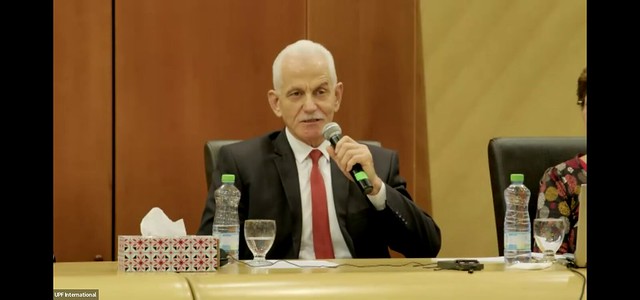Bethlehem, Palestine—The Al-Liqa’ 29th Annual International Conference concluded with the reading of closing statements and recommendations.
The conference of the Al-Liqa’ Center for Religious, Heritage and Cultural Studies in the Holy Land, which was co-sponsored by UPF, was titled “The Reality of the Church and Christians in the Middle East.”
It was held on November 25 and 26, 2022, in the Convention Palace in Bethlehem. Approximately 60 people participated in person, and in addition there were about 25 views online.
Dr. Yousef Zaknoun, the director of the Al-Liqa’ Center for Religious, Heritage and Cultural Studies in the Holy Land, read a brief summary of the presentations of the last two days.
Dr. Zaknoun expressed his hope that this conference would be a launching pad for new projects with which to create a better society and a better future.
Summary
The Al-Liqa’ Center for Religious, Heritage and Cultural Studies in the Holy Land held its 29th Annual International Conference under the title “The Reality of the Church and Christians in the Middle East.”
At the Conference Palace in Bethlehem on November 25 and 26, 2022, speakers and lecturers emphasized truth, love, conscience, justice, and responsibility, as the presence of these virtues proves the Christian existence and Christian identity, and their absence destroys Christians and non-Christians alike, disintegrates the family, spreads violence, and prevents progress.
The lecturers stressed the need to pay attention to reality with all its positives and negatives, especially scientific and technological progress and its impact on the Christian personality, the family and the universal Church, and also to pay attention to what affects and is affected by our youth, children and family members, and the problems that affect the family, including those related to life, from its inception to the hour of its end.
Hope and faith are the foundation of Christianity, and the role and responsibility of every Christian, male or female. From this standpoint, we must reconsider the composition of the Church institution and activate its members, male and female equally, and even children, each with his talents and abilities, to walk together toward a promising future that guarantees the continuation of our existence.
It is the responsibility of every Christian, male and female, to cooperate in rebuilding the Church of people, not the Church of stone. This calls for working together to build a society based on justice and equality between men and women, which is the responsibility of believers in cooperation with the Church institution, which is a radical change in this institution.
The current important responsibility is to confront extremism in our reality by resisting the tendency to be closed and withdrawn, which leads to an increase in extremism and encourages isolation, and to move toward an enlightened, coherent thought that enables us to open up to the other and live with dignity with him. In addition, there is a need to spread awareness about several issues, including:
- The effects of colonialism and neo-colonialism, which permeate through ideologies that affect all aspects of life, especially among young people.
- Although the political systems in the Arab countries call for equality between the different components of society, Christians do not feel stability in the so-called democracy of the majority, which is based on numbers and is in its essence Islamic, as the majority are Muslims.
- Exploiting political systems to fragment the Christian community, especially impacting youth
Recommendations
Based on the foregoing, the conference came up with the following recommendations, which were read by Ziad Shlewet, a journalist, writer and editor at the Sunnara newspaper, Shefa-amr.
- The need for cooperation between schools, families, Church community institutions, and the Church institution to find and share activities, tools, and methods to deal with the problems from which the Christian community suffers, and in this way to enable every area of Christian life to strengthen its identity.
- Calling on Church schools to build a humane educational curriculum and complementary programs that enhance values, identity and belonging. The Al-Liqa’ Center puts all its experience and studies at the disposal of any such institution and participates in developing this curriculum, which needs to start from early childhood.
- Cooperate with researchers in studies documenting the needs and suggest means and tools with which to deal with societal, political, religious, institutional and educational changes.
Although documenting and publishing our ecclesiastical, faith and national history are of great importance, the most important thing in these circumstances is to study the reality with a forward-looking view which guarantees the support and empowerment of future generations to face an uncertain future and to provide an incubating environment that helps young people to carry out joint activities for acquaintance and cooperation.

